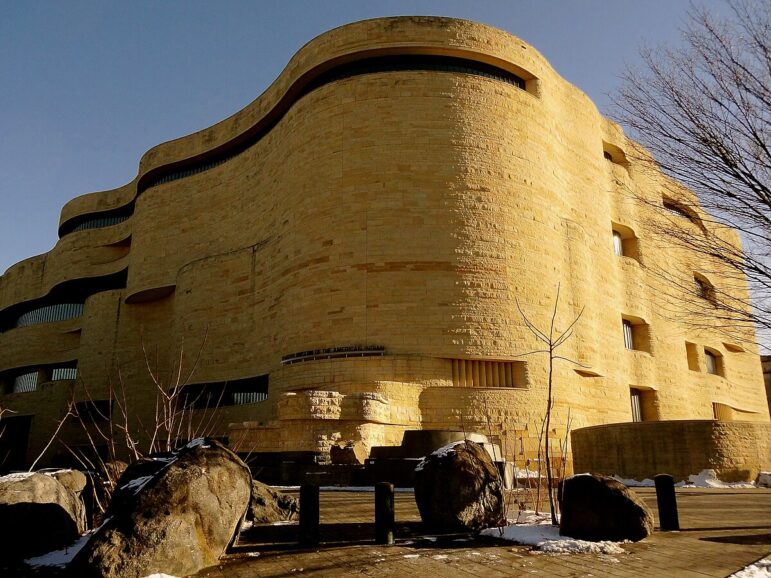WASHINTON, D.C. – Twenty years ago, the National Museum of the American Indian (NMAI) opened its doors in a six-day event filled with celebrations and processions commemorating the Indigenous peoples of the Americas. This year NMAI celebrates that anniversary by dedicating its annual Smithsonian Folklife Festival in honor of the opening.
The NMAI is part of the Smithsonian Museums and is dedicated to the history, culture, and arts of the indigenous peoples of the Americas. It is part of the Smithsonian Institution and operates three facilities. The main facility in Washington DC is located on the National Mall between the Smithsonian’s National Air and Space Museum and the U.S. Capitol. It features extensive exhibits, collections, and educational programs that highlight the diverse cultures and histories of Native American communities.
The other two facilities are the George Gustav Heye Center in New York City where the museum originally opened thirty years ago, and the Cultural Resources Center in Suitland, Maryland, which opened 25 years ago. The Maryland center houses NMAI “collections and research facilities and incorporating Indigenous practices into collections care.”

The National Museum of the American Indian [Photo Credit: Rizka CC A-SA 4.0]
This year marks the centennial of the Indian Citizenship Act, a landmark law that granted Native Americans dual citizenship in their tribal nations and the United States. Although this legislation conferred the right to vote, discriminatory state laws impeded Native Americans from fully exercising this right until the Civil Rights Act of 1964 was enacted.
Additionally, this year is the 35th anniversary of the National Museum of the American Indian Act. This act established the National Museum of the American Indian (NMAI) and entrusted the Smithsonian Institution with a vast collection of Native artifacts. It also mandated collaboration with tribal nations to repatriate Native remains and the return of sacred objects.
This year’s Smithsonian Folklife Festival celebrated the museum and the living traditions of the American Indian. The Folklife Festival is titled: Indigenous Voices of the Americas: Celebrating the National Museum of the American Indian; and will cover the primary themes of Relevance, Resistance, Representation, and Reclamation.
The Museum writes, “At its core, the program honors contemporary and traditional creative expressions, celebrations, and community connections that feed new possibilities for Indigenous futures. The program is co-presented by the Smithsonian Center for Folklife and Cultural Heritage, the National Museum of the American Indian, and the National Park Service.”
The festival will host Indigenous groups from Alaska to Chile, featuring dancers, musicians, athletes, chefs, and visual artists. They will be exploring and sharing a vast range of cultural knowledge from sustainability and ancestral foods such as the Three Sisters (beans, corn, and squash) to Indigenous science and practices. Musicians, dancers, athletes, and storytellers will showcase the richness of multigenerational traditions alongside new and innovative cultural expressions.
For those who cannot make it to Washington, D.C. the NMAI has an extension collection of videos and lectures on YouTube.
A narrative stage will provide a platform for Native people to share their traditions and perspectives with diverse audiences. The festival will also extend into the American Indian Museum, where visitors can explore various exhibitions, including “Unbound,” a new installation showcasing narrative art from the Great Plains. Additionally, visitors can dine at the newly renovated café.
“Crossing regions, nations, and cultures, the Festival makes space for crucial conversations and new lines of dialogue, all the while affirming the value and vitality of Indigenous cultures today and into the future,” The Museum noted.
The Folklife Festival will take place at the National Mall in Washington, D.C. from June 26–July 1, 2024. The Festival is also looking for volunteers to help with the event. For additional information and how to assist, visit their volunteer pages.
Bryan Kamaoli Kuwada a writer, poet, and photographer based in the Kingdom of Hawaiʻi and currently also with the University of Hawaiʻi at M ānoa’s Kamakakūokalani Center for Hawaiian Studies wrote “We always have our ancestors at our back… This connection assures us that when we move forward, we can never be lost because we always know how to get back home. The future is a realm we have inhabited for thousands of years.”
The Wild Hunt is not responsible for links to external content.
To join a conversation on this post:
Visit our The Wild Hunt subreddit! Point your favorite browser to https://www.reddit.com/r/The_Wild_Hunt_News/, then click “JOIN”. Make sure to click the bell, too, to be notified of new articles posted to our subreddit.
